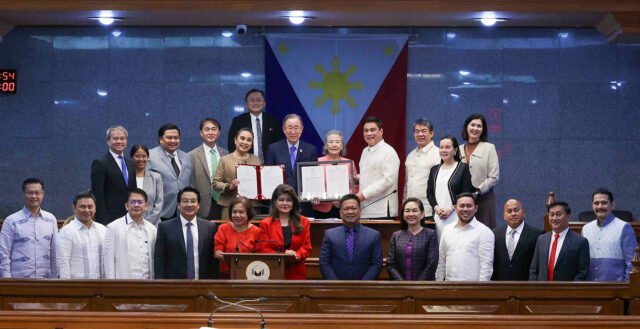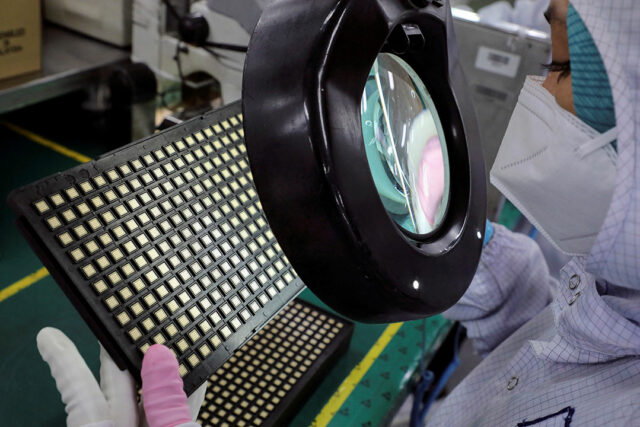THE Department of Transportation (DoTr) may need to bring the feasibility study for the Mindanao Railway project back to the National Economic and Development Authority (NEDA) to update the proposal, with the withdrawal of financing from China requiring an overhaul of cost estimates and a change of contractors.
Transportation Secretary Jaime J. Bautista in a briefing on Monday said the government has not sought financing from the Japan International Cooperation Agency (JICA) or other official development assistance (ODA) sources for the project.
“We will need to review the detailed engineering design and since this project has been delayed, we might need to again bring this to NEDA for updating,” he said.
Earlier this month, Mr. Bautista said the DoTr will continue to work on the first phase of the Mindanao Railway project after withdrawing its request for ODA from China.
The DoTr will also continue the various pre-construction activities in Davao City while negotiating funding for the project.
“We inherited this project from the previous management and they have started working with some landowners so there are lot owners already paid,” Mr. Bautista said.
“But since we will update the feasibility study, we will have to again look at the numbers and if the cost is more than 10%, we will need to go back to NEDA. Also, we’ll need to look at the ridership because the alignment is almost similar to the existing highway,” he said.
He said the government is hoping to update the feasibility study within the year, calling the Mindanao rail project “important,” noting, “we’ve already promised this.”
Mr. Bautista also said NEDA approval process has been efficient, citing the Manila International Airport project, which only took six weeks to approve.
“As long as we give the right information and numbers to NEDA, they will be able to work fast and issue the approval,” he said.
Last year, the DoTr said it is considering applying for ODA with Japan, South Korea, or India to fund the government’s three major railway projects, including the Mindanao Railway, after ruling out China as a funding source.
The decision to withdraw the Philippine request for ODA from China was due to lack of progress in signing a loan deal.
Finance Secretary Ralph G. Recto said there is a possibility the project could be implemented as a public-private partnership (PPP).
“We already have the new PPP Code. We are just awaiting as well as the updated feasibility study of the project and then we can discuss the best way to procure the project,” he said.
Jeremy S. Regino, undersecretary for railways, said the financing could very well involve DoTr budget funds, ODA, or private partners, adding that the mix of financing “will make the project more viable.”
Meanwhile, JICA Chief Representative Sakamoto Takema said the aid agency has not received any information from the Philippine government regarding the project.
“We respect the preparation of the well-organized plan like the master plan. We don’t know the details of the project. We need to see more information, maybe after (the proposal is updated) by DoTr,” he said.
The first phase of the Mindanao Railway project covers the 102-kilometer segment from Tagum City, Davao del Norte to Digos City, Davao del Sur. This segment is valued at P81.6 billion.
Once finished, the line will serve around 122,000 passengers a day and is expected to reduce travel time to one hour from the current three hours from Tagum City to Digos.
Separately, Mr. Regino said the Philippines has not terminated its negotiations on the Philippine National Railways (PNR) South Long-Haul project with China, and discussions are still ongoing.
“In fact, the CEXIM (China EXIM Bank) technical team was here last December and looking into the progress of our right of way acquisition, and another study is being conducted by the Chinese consultants,” he said.
The Duterte government in February 2022 awarded to China Railway Design Corp. a contract to build the PNR South Long-Haul project. State-owned Export-Import Bank of China, however, has not confirmed whether it will approve the loan.
“What was terminated was the Mindanao rail and the Subic-Clark (lines) but South Long-Haul has not been terminated. But we are trying to determine certain timelines so that we can move forward,” Mr. Regino said.
Mr. Recto said the study will need to have made progress before financing talks can begin.
“Personally… I prefer PPP to minimize government exposure as much as possible,” he said. “But if there are no takers and it’s a very important project and that it has to be funded, then we go through ODA.”
The PNR south long-haul project consists of a 560-kilometer rail line that will connect Metro Manila to southern eastern Luzon. It was allocated P3 billion worth of funding in the 2024 national budget.
Rail travelers to and from Bicol are expected to experience a reduction in their trip duration to four hours from the current 12.
Meanwhile, the Subic-Clark railway consists of a 71-kilometer rail line connecting the Port of Subic to Clark, the site of an international airport. — Keisha B. Ta-asan











